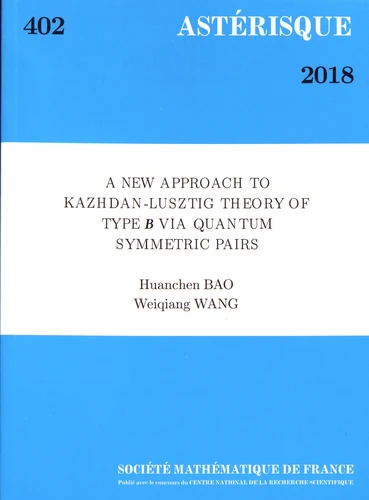Astérisque N° 402/2018
A New Approach to Kazhdan-Lusztig Theory of Type B via Quantum Symmetric Pairs
Par : , Formats :
- Paiement en ligne :
- Livraison à domicile ou en point Mondial Relay indisponible
- Retrait Click and Collect en magasin gratuit
- Réservation en ligne avec paiement en magasin :
- Indisponible pour réserver et payer en magasin
- Nombre de pages134
- PrésentationBroché
- FormatGrand Format
- Poids0.285 kg
- Dimensions17,5 cm × 24,0 cm × 1,0 cm
- ISBN978-2-85629-889-3
- EAN9782856298893
- Date de parution01/09/2018
- ÉditeurSociété Mathématique de France
Résumé
We show that Hecke algebra of type B and a coideal subal-gebra of the type A quantum group satisfy a double centralizer property, generalizing the Schur-Jimbo duality in type A. The quantum group of type A and its coideal subalgebra form a quantum symmetric pair. A new theory of canonical hases arising from quantum symmetric pairs is initiated. It is then applied to formulate and establish for the first time a Kazhdan-Lusztig theory for the BCC category ß of the ortho-symplectic Lie superalgebras osp(2m + 1 ! 2n).
In particular, our approach provides a new formulation of the Kazhdan-Lusztig theory for Lie algebras of type B/C.
In particular, our approach provides a new formulation of the Kazhdan-Lusztig theory for Lie algebras of type B/C.
We show that Hecke algebra of type B and a coideal subal-gebra of the type A quantum group satisfy a double centralizer property, generalizing the Schur-Jimbo duality in type A. The quantum group of type A and its coideal subalgebra form a quantum symmetric pair. A new theory of canonical hases arising from quantum symmetric pairs is initiated. It is then applied to formulate and establish for the first time a Kazhdan-Lusztig theory for the BCC category ß of the ortho-symplectic Lie superalgebras osp(2m + 1 ! 2n).
In particular, our approach provides a new formulation of the Kazhdan-Lusztig theory for Lie algebras of type B/C.
In particular, our approach provides a new formulation of the Kazhdan-Lusztig theory for Lie algebras of type B/C.


